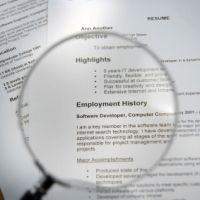Age discrimination is real. So, what can you do if you are over 50 and know hiring managers are screening you out? Some suggest leaving dates of graduation off your resume. Others suggest only listing your last 15 years of experience. The problem with these suggestions is recruiters are keen to them. Thus, if you do them - you'll get screened out anyways! Here are 3 resume tips for job seekers over 50:
1. Understand what an ATS is and how to write a resume for it.
ATS stands for Applicant Tracking System. Companies use them to match resumes that are submitted on-line to their job postings. The problem with the technology is that, according to a recent Wall St. Journal article, they actually screen out the best candidates. The solution is to keyword optimize your resume for the job you are applying to. Make sure you have all the words in the job description (skills, traits, experience, etc.) that the job description has so that you match more tightly and (hopefully) get passed on to a human for review.
2. Simplify your text.
Writing formally and with lots of multi-syllabic words screams "I'm old-school and I'm trying hard to impress you!" In fact, a study indicates when people use complex vocabulary, they actually come across as less impressive. Don't date yourself by writing in overly-formal language. Keep it simple and easy to read.
3. Be objective – a.k.a. stick to the facts.
Years ago, writing a good resume was all about making yourself sound amazing. You filled it with subjective text like, "resourceful self-starter" and "accomplished multi-tasker with outstanding attention to detail." The problem with this text is it's an opinion of yourself. And these days, recruiters are sick and tired of reading resumes where the person sounds too good to be true.
The new resume style focuses on removing over-the-top language and sticking to the quantifiable accomplishments. "15+ years managing departments ranging in size from 10-50 people with average operational budget of $500K/month," is far more impressive than saying, "I'm an exceptional people person with top-notch leadership skills and the ability to drive performance." The first one is fact, the second one is fluff. See the difference? Recruiters sure do!
As an over 50 worker, you have the professional experience and expertise to do great things for another 17+ years. However, you won't get that chance if you don't update your resume to reflect the fact that in spite of your age, you are timeless in your ability to adapt to the changing professional landscape. Updating your resume using the tips above will help you achieve a more attractive persona – and hopefully get employers to see age brings value!
Source: AOL
1. Understand what an ATS is and how to write a resume for it.
ATS stands for Applicant Tracking System. Companies use them to match resumes that are submitted on-line to their job postings. The problem with the technology is that, according to a recent Wall St. Journal article, they actually screen out the best candidates. The solution is to keyword optimize your resume for the job you are applying to. Make sure you have all the words in the job description (skills, traits, experience, etc.) that the job description has so that you match more tightly and (hopefully) get passed on to a human for review.
2. Simplify your text.
Writing formally and with lots of multi-syllabic words screams "I'm old-school and I'm trying hard to impress you!" In fact, a study indicates when people use complex vocabulary, they actually come across as less impressive. Don't date yourself by writing in overly-formal language. Keep it simple and easy to read.
3. Be objective – a.k.a. stick to the facts.
Years ago, writing a good resume was all about making yourself sound amazing. You filled it with subjective text like, "resourceful self-starter" and "accomplished multi-tasker with outstanding attention to detail." The problem with this text is it's an opinion of yourself. And these days, recruiters are sick and tired of reading resumes where the person sounds too good to be true.
The new resume style focuses on removing over-the-top language and sticking to the quantifiable accomplishments. "15+ years managing departments ranging in size from 10-50 people with average operational budget of $500K/month," is far more impressive than saying, "I'm an exceptional people person with top-notch leadership skills and the ability to drive performance." The first one is fact, the second one is fluff. See the difference? Recruiters sure do!
As an over 50 worker, you have the professional experience and expertise to do great things for another 17+ years. However, you won't get that chance if you don't update your resume to reflect the fact that in spite of your age, you are timeless in your ability to adapt to the changing professional landscape. Updating your resume using the tips above will help you achieve a more attractive persona – and hopefully get employers to see age brings value!
Source: AOL





